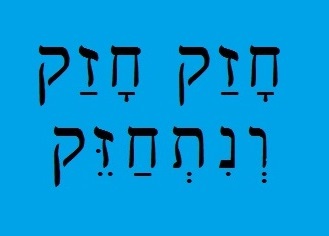It is traditional, at the conclusion of reading each book of the Torah, for the congregation to recite the phrase “Chazaq! Chazaq! v’Nitchazeq! – Be strong! Be strong! And let us be strengthened!” Throughout the world, many who are reading through the annual Torah cycle will encourage each other with these words.
Although this exact phrase does not appear in Scripture, we find similar encouragement from Moses to Joshua and the Israelites just before his death. Three times Moses says, “Be strong (chazaq) and courageous” (Deuteronomy 31:6,7,23). Then only a short time later and prior to entering the land, the same encouragement is given four more times (Joshua 1:6,7,9,18).
The phrase Chazaq! Chazaq! v’Nitchazeq! – Be strong! Be strong! And let us be strengthened – is a three-time repetition of the same word. The first two times, the word is in the imperative, or command, form. The instruction is: Be strong! Be strong! How exactly are we to do that? When God told Joshua and the Israelites to “Be strong and courageous,” He also told them how. They simply needed to do what He said.
“Be strong and courageous, for you shall give this people possession of the land which I swore to their fathers to give them. Only be strong and very courageous; be careful to do according to all the law which Moses My servant commanded you; do not turn from it to the right or to the left, so that you may have success wherever you go. This book of the law shall not depart from your mouth, but you shall meditate on it day and night, so that you may be careful to do according to all that is written in it; for then you will make your way prosperous, and then you will have success. Have I not commanded you? Be strong and courageous! Do not tremble or be dismayed, for the LORD your God is with you wherever you go” (Joshua 1:6-9).
The third occurrence of the word in this phrase is quite interesting. In Hebrew grammar, this word is in the Hithpael stem. In other words, this verb is in a reflexive form. And although when we recite the phrase we say, “and let us be strengthened,” the actual meaning of this form of the verb is, “and let us strengthen ourselves.” An example of the Hithpael or reflexive form of this verb can be found in 1 Samuel 30:6, “But David strengthened himself in the LORD his God.”
The example with David is in the third person singular: David strengthened himself. When we declare Chazaq! Chazaq! v’Nitchazeq!, the third word – the reflexive verb – is in the first person plural. It involves us, collectively. We strengthen ourselves by drawing strength from each other. So, at the conclusion of the public reading of each of the five books of the Torah, we collectively proclaim to each other, “Be strong! Be strong! And let us be strengthened.”
Many years later, King Hezekiah led Judah in defending Jerusalem against the Assyrian king Sennacherib, encouraging them with the same words Moses and Joshua had spoken.
“He appointed military officers over the people and gathered them to him in the square at the city gate, and spoke encouragingly to them, saying, ‘Be strong and courageous, do not fear or be dismayed because of the king of Assyria nor because of all the horde that is with him; for the one with us is greater than the one with him. With him is only an arm of flesh, but with us is the LORD our God to help us and to fight our battles.’ And the people relied on the words of Hezekiah king of Judah” (2 Chronicles 32:6-8).
King Hezekiah expressed this strength to his people not only in these words of encouragement, but also in his very being. His name is a combination of the word chazaq and the Divine Name. Chizqi-yah (Hezekiah) means “My strength is Yahweh.”
Similarly, one of the prophets who spoke the most about the restoration of Israel testifies to the source of the restoration through his name. Yechez’q-el (Ezekiel) means “God strengthens.”
The restoration of both houses of Israel – Judah and Ephraim – is taking place now. We are preparing to enter the Promised Land, just as the ancient Israelites in the wilderness. Now is the time for the returning remnant to come together, as our Father is raising up the “fallen tabernacle of David … as in the days of old” (Amos 9:11). This week, as we conclude another book of the Torah, we also pray for the restoration of all Israel. Encourage each other with these words:
Chazaq! Chazaq! v’Nitchazeq!
Be Strong! Be Strong! And Let Us Be Strengthened!
“Finally, my brethren, be strong in the Lord and in the power of His might” (Ephesians 6:10).


In the Book of the Prophet Haggai 2:4 we find the same message of encouragement: ‘Be strong… and work. For I Am with you, Say the Lord of the Hosts.’ We can always encourage one another to be strong because HE is with us!